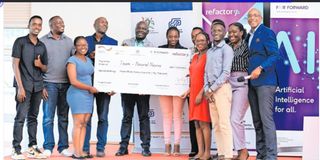Partnerships are crucial in propagating technology

Edith Naissanga (in red) and her group were some of the groups that won during the Refactory graduation. PHOTOS/JOAN SALMON
What you need to know:
- The programme's focus was to equip students relevant skills to hit the ground running and build real-world projects right from the start. Most importantly, the programme did not only focus on technical skills but also critical issues such as ethics in AI.
The programme’s focus was to equip students with relevant skills to hit the ground running and build real-world projects right from the start. Most importantly, the programme did not only focus on technical skills but also critical issues such as ethics in AI.
As she delivers her graduation speech, Edith Naisanga cannot hide her joy. It has been a long time coming and this day, her graduation day marks the culmination of a labour of love. When she chose to take a break from the telecommunication world, Naisanga was in search of a new path.
“I needed to recalibrate myself and the call for machine learning students at Refactory, under GIZ, was what I needed. The scholarship was also an invaluable opportunity for me because I would not have otherwise afforded the course as I was on a career break,” she says.
Naisanga’s choice for this course stems from her understanding that Machine Learning (ML) and Artificial Intelligence (AI) are transforming all industries be it healthcare, education, business, and agriculture. She, therefore, found it a very critical skill to have if she was to stand out from the crowd.
“We need more Ugandans skilled in AI if we are to harness its full potential across various industries,” she says.
Naisanga graduated with a certificate in Artificial Intelligence/Machine Learning (AI/ML) from Refactory. This cohort was done in partnership with Deutsche Gesellschaft für Internationale Zusammenarbeit (GIZ) as part of the “FAIR Forward – Artificial Intelligence for All” initiative that lasted six months. The graduates also completed a capstone project applying their knowledge to real-world challenges.
Partnership
Ivan Mukiibi, the project lead of FAIR Forward at GIZ, says the project’s main goal was democratising AI, which was achieved through the machine learning programme.
“One of the things that caught my attention was students trying to implement an end-to-end machine learning project. Nonetheless, it should not remain on your laptop but go to production to become beneficial,” he said.
Joanitah Nalubega, the programme lead at Refactory shares that the Refactory-GIZ partnership focused on skilling mostly professionals who handle data to do more with data to drive business decisions and meaningfully participate in the Digital Economy.
“New skills open up new avenues for employment in the digital economy locally and globally. That means more incomes, more employment opportunities and more role models for the younger generations,” she says.
From her perspective, Naisanga says the partnership removed entry barriers to AI while enhancing Refactory’s desire to skill Ugandans with marketable tech skills.
“I think this was a wonderful collaboration, whose goals were perfectly aligned to deliver an exceptional course,” she says.
Gains
Looking back, Naisanga says the course exceeded her expectations as the syllabus was well structured and covered all crucial aspects of AI, from the foundational theories to advanced applications.
“The programme’s focus was to equip us with relevant skills to hit the ground running and build real-world projects right from the start. Most importantly for me, the programme did not only focus on technical skills but also critical issues such as ethics in AI, reminding us of the responsibility to develop AI systems that address challenges rather than perpetuate existing biases,” she says.
Naisanga remembers her classes with profound joy, saying the facilitators were top AI experts in Uganda who are vested in solving Ugandan challenges using AI. From these, the class gained practical insights as the tutors taught from experience.
One of these was Ernest Mwebaze, the executive director of Sunbird, who shared real-world examples of how AI is being leveraged to transform Uganda’s industries. Part of the practicality was done in the capstone projects fuelled by GIZ, which he says made the students think outside the box.
“It was not just about using these toolboxes and platforms to build software. The capstone projects allowed them think about the solution in real-life settings. It was very notable to see how people thought about data and features and some of them made it to the top five globally,” he says.
Naisanga also loved the project-based learning approach and the emphasis that was placed on learning soft skills such as pitching ideas to a non-technical audience.
Today, she is a proud AI researcher at the Makerere University’s AI Health Lab where they are developing an AI-powered disease diagnostic tool for malaria, tuberculosis and cervical cancer.
“I am also a research fellow under the mentorship of a research scientist at Stanford University where we are collaborating on developing a Brain MRI foundation model. This will be used in detecting various neurological conditions such as Alzheimer’s disease,” she says.
Naisanga credits the GIZ-Refactory programme for equipping her with invaluable skills that not only helped her achieve her transition dream but also make an impact in healthcare in Uganda and beyond.
“I will forever be grateful to GIZ and Refactory for giving me this life-changing opportunity,” she says.
Nalubega concludes that Refactory’s partnership with GIZ to skill AI professionals is a key step in building a critical mass of professionals who can drive the adoption of emerging technologies with a focus on Uganda’s context.
“Through this, we empower businesses to benefit from efficiency (data-driven decision-making), time-saving (avoiding slow human responses to repetitive tasks), cost-cutting (faster and more efficient processes) and automation. These skills also allow the industry to leapfrog into the Fourth Industrial Revolution and build upon emerging technologies,” she says.




